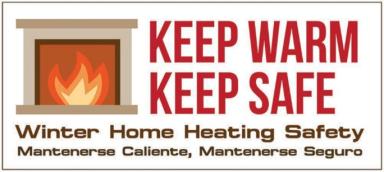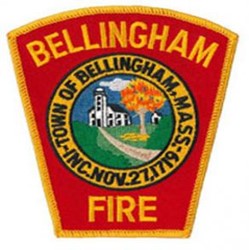Fire Safety Tip of the Month


Captain Brad Kwatcher’s fire safety tip of the month
It’s that time of year again! The cold weather is setting in and home eating is going to be on the rise. The other issue we are running into is the rising price of home heating fuel.
Some important safety tips when dealing with the cold to keep you and your family safe this winter season!
Carbon Monoxide (very important)!
What is Carbon Monoxide? Carbon Monoxide is an odorless, colorless, tasteless gas that is found in fumes produced any time you burn fuel in cars or trucks, small engines, stoves, lanterns, grills, fireplaces, gas ranges, or furnaces. CO can build up indoors and poison people and animals who breathe it.
Sources of CO:
Furnaces and water heaters
Chimneys and woodstoves
Gas and oil fueled space heaters
Blocked furnace and dryer vents
Car tailpipes blocked by snow
Generators
Running vehicles
Barbeque grills and camping stoves
Gas ovens used for heat
Gas tools such as snow removal and yard equipment
Appliances of CO
Appliances and CO Safety If appliances that burn fuel are properly maintained and used, the amount of CO produced is usually not hazardous. Read and follow the manufacturer’s instructions that come with fuel-burning devices. However, if appliances are not working properly or are used incorrectly, dangerous levels of CO can result.
Have a qualified service technician inspect your appliances yearly, before the heating season.
Check vent pipes, flues and chimneys for leaks or blockages.
Un-vented kerosene heaters are illegal in MA.
Never use a charcoal grill indoors!
Do not use a gas oven to heat your home.
Don’t leave a vehicle running inside a garage, even if the door is open. Fumes will build up quickly inside the home.
Snow can block car tailpipes outdoors.
Never use gasoline-powered engines (generators, chain saws, blowers, weed trimmers, mowers or snow blowers) indoors or near doors or windows.
Hundreds of people die accidentally each year from CO poisoning caused by malfunctioning or improperly used fuel-burning appliances (EPA data). According to the Journal of the American Medical Association (JAMA), CO is the number one cause of poisoning deaths in the U.S. Carbon monoxide gas is produced whenever any fuel, such as gas, oil, kerosene, wood or charcoal is burned. Symptoms of Carbon Monoxide (CO) Poisoning CO enters the lungs and blood where it competes with oxygen normally carried by red blood cells. CO attaches to the cells 200 times easier than oxygen. Without oxygen, cells begin to die.
Exposure to carbon monoxide can produce flu-like symptoms such as:
Headache
Nausea
Dizziness
Confusion
Fainting At higher levels, CO exposure can cause:
Unconsciousness
Death What to Do If You Suspect CO Exposure
Get out of the house or car and get fresh air.
Call the fire department from a neighbor’s house.
If you have symptoms, seek medical help immediately
How Can we protect you?
Install carbon monoxide alarms on every level of your home, except unfinished basements or attics.
Since 2006, state law has required carbon monoxide alarms in most homes.
Locate CO alarms near bedrooms so family members will awaken at night.
Alarms should be kept away from open windows or doors, excessively hot, cold or damp areas and “dead-air spaces” such as corners of rooms and peaks of ceilings.
Do not place a CO alarm in a garage, furnace room, near the stove or fireplace.
Change the batteries according to directions.
Change the back-up batteries after a prolonged power outage.
Know the difference between the alarm signal:
4 beeps indicate there is a possibility of CO.
2 beeps indicate the end of life of the detector.
1 beep (or chirp) every few seconds battery needs to be replaced.
Make sure that any alarm you purchase is approved and certified by a nationally recognized testing agency, such as Underwriters Laboratory (UL). Several types of alarms are allowed Massachusetts:
Battery powered with battery monitoring (a low battery signal); – Plug-in (AC powered) units with battery backup; –
Hard-wired with battery backup (usually involves hiring an electrician); – Combination smoke detectors and CO alarms that have a signal as well as a voice alert; – Low-voltage with secondary power
Follow installation instructions carefully
Heating caused 6,692 fires over the past five years and is the number two cause of home fires in Massachusetts. Use your home heating system and space heating appliances wisely and responsibly. That’s the way to Keep Warm and Keep Safe!
The ABCs of Fire Safety:
Make sure there are working smoke alarms and carbon monoxide alarms on every level including one outside the bedrooms.
Test smoke and carbon monoxide alarms monthly and change batteries twice a year, when you change the clocks.
Hold home fire drills to practice the home escape plan.
Practice home fire safety and set a good example for the children
Be Careful When Using Fireplaces and Solid Fuel Stoves If you heat your home by burning solid fuels (coal, firewood, pellets), be careful before, during and after using these kinds of fuels.
Have the chimney professionally cleaned every year.
Make sure the stove is approved by a national testing agency such as Underwriter’s Laboratory (UL).
Get a building permit before installing a stove.
Keep anything that can burn three feet away.
Dispose of the ashes in a metal container, with a lid, away from the house, garage and porch.
Space Heaters Need Space Fires caused by space heaters are rare but often deadly. If you must use a space heater, do so safely.
Do not use space heaters as your #1 heating source.
Keep anything that can burn three feet away.
Heavy duty UL listed extension cords.
Always turn off when going to bed or leaving home.
Portable kerosene heaters are illegal in MA for home use.
Maintain Natural Gas Equipment Natural gas is a safe and efficient way to cook, heat our homes and hot water.
Have your furnace and hot water heater professionally checked every year.
Do not use or store gasoline or painting supplies inside where they can be ignited by the pilot light.
Smell Gas? GET OUT AND CALL 9-1-1!
Maintain Oil Heating Equipment Home heating with fuel oil is also safe and efficient.
Have your furnace professionally cleaned and checked every year.
Don’t let the tank get completely empty.
Call for service if the oil burner releases smoke or soot in the house.
Fuel Assistance For information on fuel assistance, please call the HEATLINE at 1-800-632-8175 (or for Boston only 617-357-6012) or on-line at www.mass.gov/dhcd.

